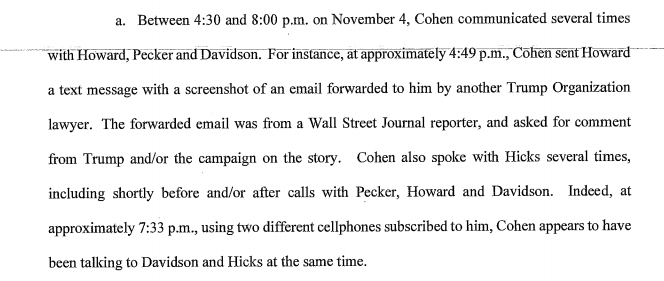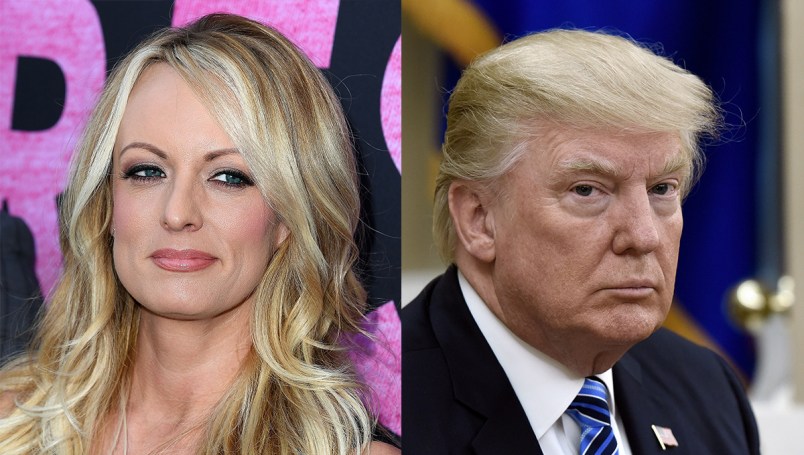Newly revealed search warrant applications from the federal investigation of Michael Cohen contain a range of bizarre, surprising moments, as Trumpworld scrambled to cover up an affair that then-candidate Donald Trump had with a porn star.
The documents reveal frantic moves by Cohen and others, including Trump campaign press secretary Hope Hicks, to buy Stormy Daniels’s silence. The FBI’s allegations are new, and paint a picture of high-level involvement from Trump himself and his close associates as they struggled – and ultimately failed – to contain the story of Trump’s affair with a porn star.
The warrant applications also shed new light on elements of how the FBI approached an incredibly sensitive investigation into the President’s inner circle, including executives at his closely held company.
Below are a series of highlights from the documents.
Access Hollywood
It was the release of the Access Hollywood tape in October 2016 that set off alarm bells in the Trump campaign regarding the potential that Daniels would go to the press, the FBI alleged.
The Access Hollywood tape was very obviously damaging to Trump and his presidential bid, though not fatal.
But in the FBI’s portrayal, the release of the tape injected a sense of urgency within the Trump campaign to resolve the Stormy Daniels situation, spurring them to seek a way to buy her silence.
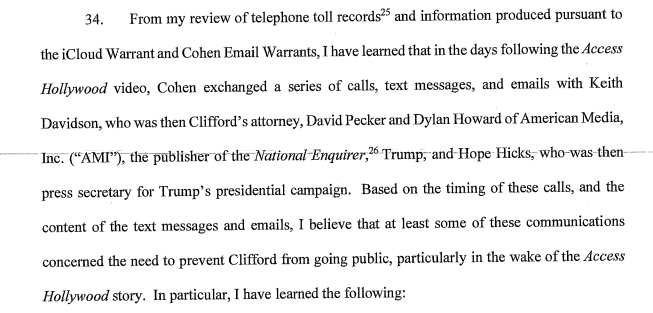
FBI Decision-making
One of the overarching questions about the probe remains how the FBI approached an investigation that touched a sitting President, and his eponymous, closely held company: the Trump Organization.
The documents offer real insight into that question, suggesting that federal investigators – at least at the probe’s beginning – appeared to keep their distance from steps that would have taken them within the Trump Organization itself.
At one point, for example, the FBI cited a Washington Post report when referring to an internal Trump Organization email with Davidson.
In a footnote, the FBI explained why it had not obtained the email itself. “The USAO has not requested documents from the Trump Organization or Davidson, and thus does not possess the email referenced in this article.” The FBI wrote that it hadn’t made the request “due to the partially covert nature of the investigation.”

In another application for a warrant that would authorize the government to search hard drives obtained from April 2018 raids on Cohen’s apartment, the FBI laid out the topics it was interested in reviewing from the contents of the hard drives.
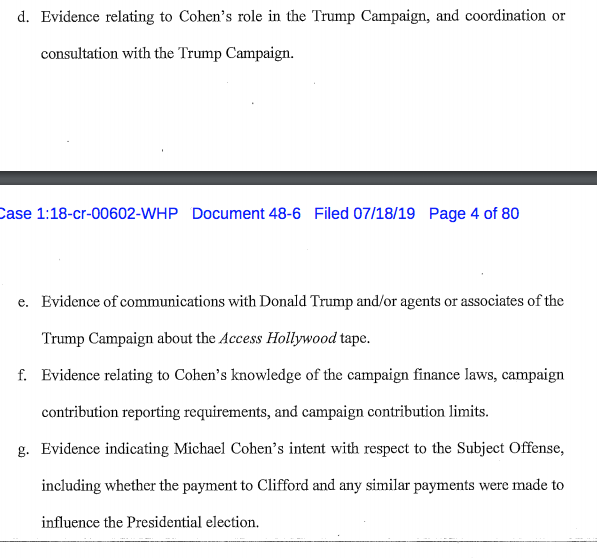
From that application, it does not appear that prosecutors were focused on delving deep within the Trump Organization itself, instead tailoring the areas of their search to cover the campaign finance violation at issue.
Lingering questions about Hope Hicks
One big reveal was the role of Trump campaign press secretary Hope Hicks, who spoke with Cohen multiple times as the Trump fixer tried to arrange the hush money payment to Daniels, the FBI alleged.
Hicks was involved with Trump and Cohen from the start of the scheme’s development, according to the FBI. On Oct. 8, when Cohen began to speak with Daniels’s attorney and AMI executives about the scheme, he first had a phone call with Trump and Hicks.
The FBI described in a footnote to the search warrant application its process for determining who was on the call.
It’s not clear what was discussed on the call; only that a phone call took place. At the end of the footnote, the FBI wrote that in a separate interview with federal investigators, “Hicks stated, in substance, that to the best of her recollection, she did not learn about the allegations made by Clifford [Daniels] until early November 2016. Hicks was not specifically asked about this three-way call.”

Hicks certainly learned of the allegations of an affair by Nov. 4, when the Wall Street Journal published an article about Daniels and the attempt to buy her silence. She gave a statement to the Journal in her capacity as campaign press secretary, saying it was “absolutely, unequivocally” untrue that Daniels had had a relationship with Trump.
After the article was released to relatively muted reception, the FBI alleged, Hicks and Cohen rejoiced. “Keep praying!! It’s working!” Hicks wrote.

Going to the vault
Cohen stored various documents related to the hush money scheme in a bank vault.
The FBI alleged that Cohen visited the vault at various points after the scheme concluded, but with suspicious timing. The government made note of this in an application for a warrant to raid Cohen’s apartment, hotel room, and office, saying that his visits were evidence that he may have moved important records to another location.
The first vault visit allegedly occurred in November 2017, with Cohen speaking with Davidson after leaving the bank. The second visit is alleged to have taken place in February 2018, as news reports about the Daniels story mounted.
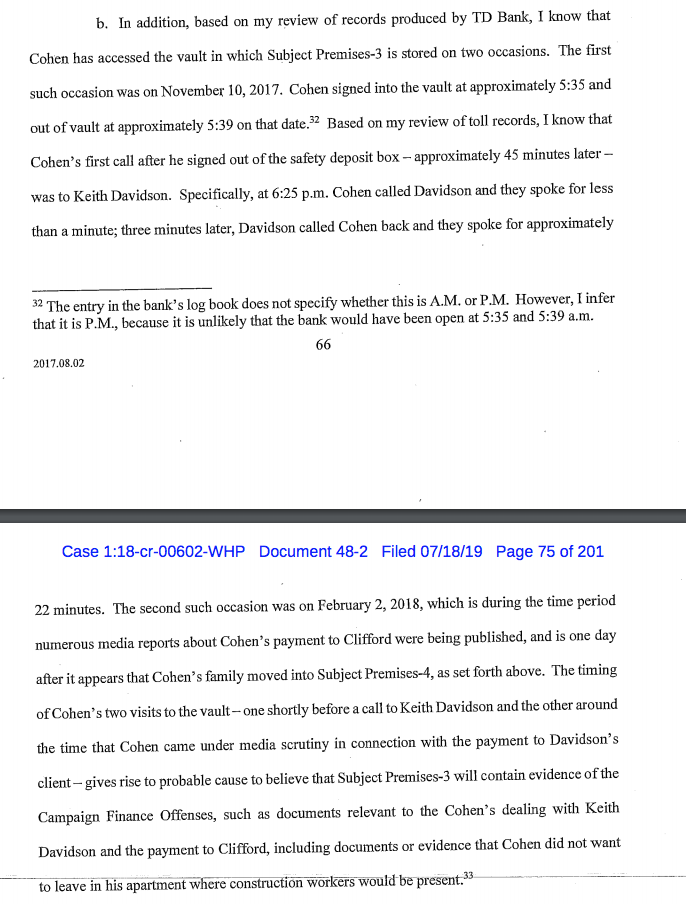
It’s not clear from the filing what happened to the documents in question. The warrant applications only offer a snapshot of the government’s investigation at the time that the documents were written.
Reacting to the WSJ story
The Wall Street Journal story that Hicks denied was published on the evening of Nov. 4.
The warrant applications show how all of the people who arranged the Daniels payoff scheme panicked and scrambled as news of the impending story reached them.
Dylan Howard, AMI’s chief content officer, wrote to Cohen saying “I think it’ll be ok pal.”
Cohen replied saying “He’s pissed.” The FBI alleged that Cohen was referring to Trump.
Howard replied to that with the text equivalent of a shrug. “I’m pissed! You’re pissed. Pecker is pissed. Keith is pissed. Not much we can do.”
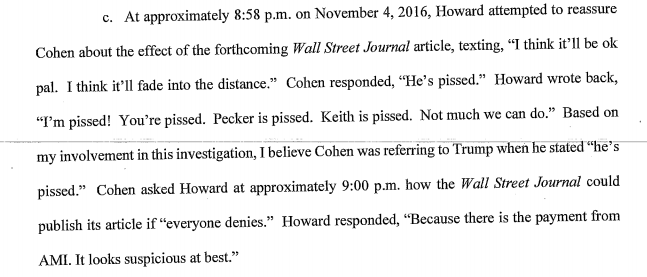
But, knowing that the story was about to drop, Cohen sprung into action.
The FBI alleged that Cohen perceived the situation as serious enough to warrant speaking on two different cell phones at the same time, using the move to allegedly negotiate with Davidson and Hicks simultaneously.
